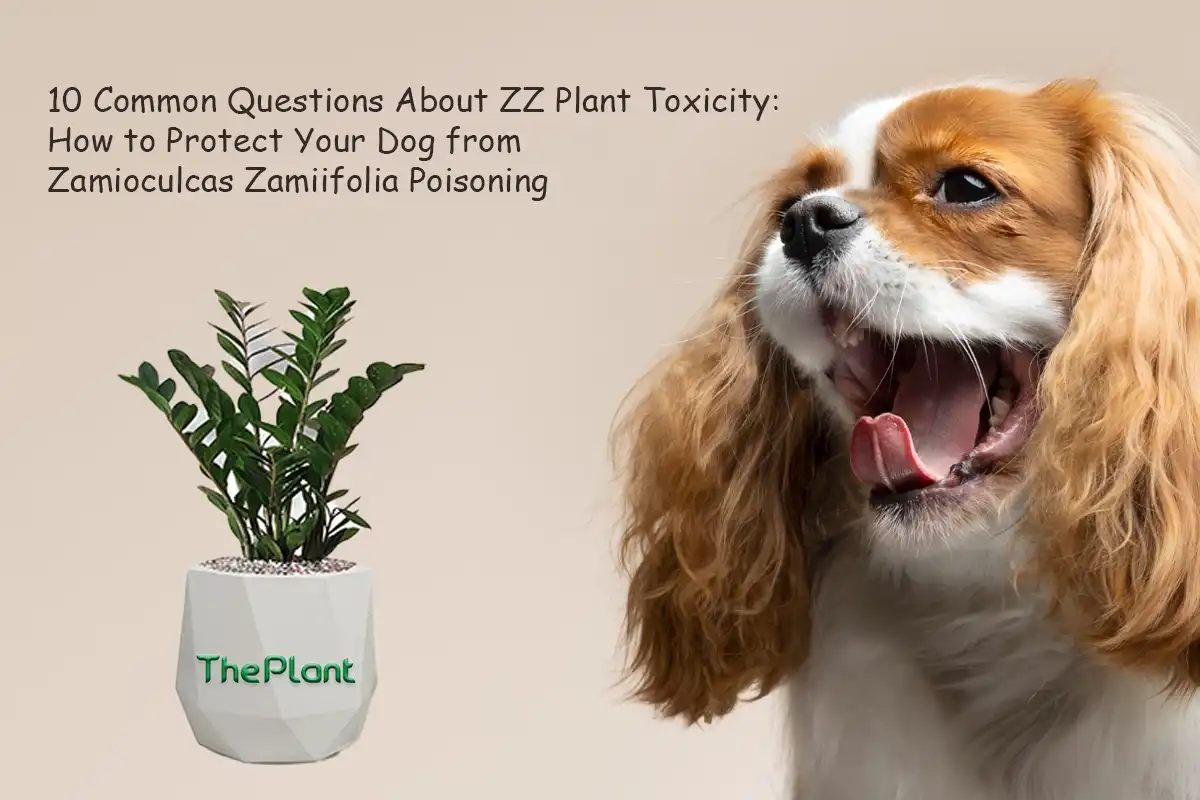10 Common Questions About ZZ Plant Toxicity: How to Protect Your Dog from Zamioculcas Zamiifolia Poisoning

Are You Most-Loved Plant Poisoning Your Dog Secretly? Zamioculcas Zamiifolia
As a responsible pet owner, you take every possible precaution to make your home safe for the furry being staying with you. But did you know that one of the most popular houseplants in the world, Zamioculcas zamiifolia, commonly known as the ZZ plant, can pose a potentially serious health risk to your dog?
Why is the ZZ Plant Considered Dangerous?
The ZZ plant has insoluble oxalate crystals of calcium responsible for various health issues in dogs if ingested. These sharp crystals will irritate the mouth, throat, and stomach of your pet, which these signs may manifest:
- Excessive drooling
- Vomiting
- Difficulty in swallowing
- Swelling of the mouth or tongue
What to Do If Your Dog Eats a ZZ Plant?
Call your veterinarian or an emergency animal poison control hotline if you think your dog has ingested any part of the ZZ plant. While mild cases might only involve discomfort, severe poisoning could lead to complications that require medical intervention.
Make Your Dog Safe from Poisonous Plants
Remove or Relocate Toxic Plants: If you already have ZZ plants, consider moving them to rooms your dog cannot get into or replacing them with pet-safe plants, such as spider plants.
Supervise Your Dog Indoors: Monitor your dog’s activity around house plants to ensure he doesn’t inadvertently ingest anything.
Educate Yourself on Toxic Plants: Learn about other common toxic plants like lilies, aloe vera, and philodendrons that can harm your pets.
Safe Alternatives to ZZ Plant’s
Many non-toxic houseplants are just as beautiful but safe for your dog. Consider replacing the ZZ plant with options like these:
- Areca palm
- Boston fern
- Baby’s tears
Houseplants that are safe for dog owners: contrasting the ZZ Plant with other alternatives that are friendly to pets
Houseplants are not only aesthetically pleasing but also deliver a breath of fresh air into our living spaces. On the other hand, dog owners must be cautious while selecting plants because the best ones do not harm our four-legged family members. Although the ZZ plant, also known as Zamioculcas zamiifolia, is one of the most resilient options for houseplants, it is also quite easy to care for but extremely poisonous to dogs. In a fortunate turn of events, numerous choices are both non-toxic and appealing that can breathe new life into your house without risking your pet’s health.
Risks posed by the ZZ Plant
Calcium oxalate crystals, which are found in the ZZ plant, have the potential to cause severe pain symptoms in dogs if they are consumed. This plant poses a possible risk to canines. As a result of the sharp crystals’ ability to irritate the mouth, throat, and stomach, individuals may experience drooling, vomiting, and difficulty swallowing. Even though the symptoms are typically moderate, it is sometimes important to seek the assistance of a veterinarian. Providing a pet-friendly environment can be accomplished in several ways, one of which is by replacing it with safe alternatives.
Alternatives That Are Not Toxic
ZZ plants can be replaced with varieties that are just as pleasant to pets. Aesthetically pleasing houseplants include the non-toxic Areca palm, the non-toxic Boston fern, and the non-toxic Spider plant. This is in addition to the houseplants that require little maintenance. To ensure you can enjoy houseplants without any concerns, these solutions strike a delicate balance between fashion and safety.
Benefits of Plants That Are Safe for Pets
Dog owners can gain peace of mind while looking fashionable with pet-safe plants. Areca palms, for instance, have an appearance that is reminiscent of the tropics, Boston ferns have luxuriant foliage, and spider plants have a remarkably contemporary style. Consequently, if you select these non-toxic kinds, your indoor garden will be in excellent condition without putting the health of your pets at risk.
Comparison Table: Pet-Safe Alternatives to the ZZ Plant
| Plant Name | Toxic to Dogs? | Appearance | Care Level | Unique Features |
|---|---|---|---|---|
| ZZ Plant | Yes | Dark green, waxy leaves, upright form | Low maintenance | Toxic to dogs; contains calcium oxalate crystals |
| Areca Palm | No | Feather-like, bright green fronds | Low maintenance | Adds tropical feel, non-toxic to pets |
| Boston Fern | No | Lush, soft, green fronds | Moderate care | Great for hanging baskets, non-toxic to pets |
| Spider Plant | No | Long, arching, striped green leaves | Very low care | Striking look, easy to grow, non-toxic to pets |
| Baby’s Tears | No | Tiny, round green leaves | Moderate care | Dense, mat-forming growth, ideal for ground cover |
This comparison chart highlights key features of the ZZ plant and its non-toxic alternatives, helping you make informed decisions when choosing the right houseplants for your home.
Final Thoughts
It is simple and responsible for any pet owner to dispose of poisonous plants like the ZZ plant by substituting them with safe alternatives. Choose plants that are not only beautiful but also low-maintenance and will fit the design of your home to minimize the potential harm that poisonous plants could cause. The following compares the ZZ plant with some of the most beneficial houseplants that are safe for pets.
10 Frequently Asked Questions (FAQ) and Answers:
- Is the ZZ plant toxic to dogs?
Yes, the Zamioculcas Zamiifolia (ZZ plant) is toxic to dogs. It contains calcium oxalate crystals, which can irritate the mouth, throat, and digestive tract if ingested. - What happens if my dog eats a ZZ plant?
If your dog eats any part of the ZZ plant, it may experience symptoms like excessive drooling, vomiting, difficulty swallowing, or swelling in the mouth and throat. - How much ZZ plant is toxic to dogs?
Even a small amount of the ZZ plant can cause irritation and discomfort in dogs. The severity depends on the quantity ingested, but any exposure should be treated as potentially dangerous. - What should I do if my dog chews on a ZZ plant?
Immediately remove the plant from your dog’s mouth and rinse the mouth with water. Contact your vet or a pet poison control hotline for further guidance. - Are the symptoms of ZZ plant poisoning in dogs serious?
Symptoms are generally mild to moderate, including irritation, drooling, and vomiting. However, in some cases, more severe reactions can occur, and veterinary intervention may be needed. - Can a dog die from eating a ZZ plant?
While death is rare, severe cases of ZZ plant poisoning, especially if left untreated, could lead to complications. Prompt action is crucial to avoid any serious health risks. - How long do symptoms last after a dog eats a ZZ plant?
Symptoms can last from a few hours to a couple of days, depending on the severity of the ingestion. Veterinary care can help manage symptoms more effectively. - Are there any safe alternatives to the ZZ plant for homes with dogs?
Yes, you can replace the ZZ plant with non-toxic options like spider plants, Boston ferns, or Areca palms, which are safe for pets. - Can I still have a ZZ plant if I own a dog?
Yes, but it’s advisable to keep the plant in areas that are out of your dog’s reach, like high shelves or closed rooms, to prevent accidental ingestion. - What other houseplants are toxic to dogs?
In addition to the ZZ plant, other toxic houseplants for dogs include lilies, aloe vera, philodendrons, and poinsettias. Always research the plants you keep around pets.





